#information system
Text
Information Technology
Information Technology
What is Information Technology?
Information Technology (IT) is a term that arouse during the 1970’s to describe the combination of two previously existing discipline, computing and telecommunication. Very many definitions of the term exist ranging from the narrow, that would encompass those traditional aspects of office data processing to the broad, that would involve the…

View On WordPress
#ai#android#apple#artificial-intelligence#black box#blockchain technology#chatgpt#computer#computing#disruption#disruptive technology#forex trading#gaming#hybrid#information system#information technology#innovation#invention#machine learning#microsoft#phone#quantum-computing#remote working#robots#smartphones#system#technologies#technology#telecommunication#web 3
0 notes
Text
Management Information Systems: Managing the Digital Firm Global Edition 17th edition Kenneth Laudon, Jane Laudon

#student#studying#studyblr#studyspo#study motivation#study blog#student life#study notes#university#studies#project management#information system#college#college student#college life
0 notes
Text
*peering down at my own genetic sequence* uh-huh uh-huh bold choice bold fucking choices my friend
#and i don't have veto power over any of this? that Cannot be correct information#there must surely exist an Appeal Process or#*me discovering how any of reality's systems function* this can not POSSIBLY be how this system functions#*scribbling furiously filling an entire college ruled notebook DOUBLE-SIDED with a list of design flaws to present to the court*
9K notes
·
View notes
Text
The majority of censorship is self-censorship

I'm on tour with my new novel The Bezzle! Catch me TONIGHT in SAN DIEGO (Feb 22, Mysterious Galaxy). After that, it's LA (Saturday night, with Adam Conover), Seattle (Monday, with Neal Stephenson), then Portland, Phoenix and more!

I know a lot of polymaths, but Ada Palmer takes the cake: brilliant science fiction writer, brilliant historian, brilliant librettist, brilliant singer, and then some:
https://pluralistic.net/2022/02/10/monopoly-begets-monopoly/#terra-ignota
Palmer is a friend and a colleague. In 2018, she, Adrian Johns and I collaborated on "Censorship, Information Control, & Information Revolutions from Printing Press to Internet," a series of grad seminars at the U Chicago History department (where Ada is a tenured prof, specializing in the Inquisition and Renaissance forbidden knowledge):
https://ifk.uchicago.edu/research/faculty-fellow-projects/censorship-information-control-information-revolutions-from-printing-press/
The project had its origins in a party game that Ada and I used to play at SF conventions: Ada would describe a way that the Inquisitions' censors attacked the printing press, and I'd find an extremely parallel maneuver from governments, the entertainment industry or other entities from the much more recent history of internet censorship battles.
With the seminars, we took it to the next level. Each 3h long session featured a roster of speakers from many disciplines, explaining everything from how encryption works to how white nationalists who were radicalized in Vietnam formed an armored-car robbery gang to finance modems and Apple ][+s to link up neo-Nazis across the USA.
We borrowed the structure of these sessions from science fiction conventions, home to a very specific kind of panel that doesn't always work, but when it does, it's fantastic. It was a natural choice: after all, Ada and I know each other through science fiction.
Even if you're not an sf person, you've probably heard of the Hugo Awards, the most prestigious awards in the field, voted on each year by attendees of the annual World Science Fiction Convention (Worldcon). And even if you're not an sf fan, you might have heard about a scandal involving the Hugo Awards, which were held last year in China, a first:
https://www.nbcnews.com/news/world/science-fiction-authors-excluded-hugo-awards-china-rcna139134
A little background: each year's Worldcon is run by a committee of volunteers. These volunteers put together bids to host the Worldcon, and canvass Worldcon attendees to vote in favor of their bid. For many years, a group of Chinese fans attempted to field a successful bid to host a Worldcon, and, eventually, they won.
At the time, there were many concerns: about traveling to a country with a poor human rights record and a reputation for censorship, and about the logistics of customary Worldcon attendees getting visas. During this debate, many international fans pointed to the poor human rights record in the USA (which has hosted the vast majority of Worldcons since their inception), and the absolute ghastly rigmarole the US government subjects many foreign visitors to when they seek visas to come to the US for conventions.
Whatever side of this debate you came down on, it couldn't be denied that the Chinese Worldcon rang a lot of alarm-bells. Communications were spotty, and then the con was unceremoniously rescheduled for months after the original scheduled date, without any good explanation. Rumors swirled of Chinese petty officials muscling their way into the con's administration.
But the real alarm bells started clanging after the Hugo Award ceremony. Normally, after the Hugos are given out, attendees are given paper handouts tallying the nominations and votes, and those numbers are also simultaneously published online. Technically, the Hugo committee has a grace period of some weeks before this data must be published, but at every Worldcon I've attended over the past 30+ years, I left the Hugos with a data-sheet in my hand.
Then, in early December, at the very last moment, the Hugo committee released its data – and all hell broke loose. Numerous, acclaimed works had been unilaterally "disqualified" from the ballot. Many of these were written by writers from the Chinese diaspora, but some works – like an episode of Neil Gaiman's Sandman – were seemingly unconnected to any national considerations.
Readers and writers erupted in outrage, demanding to know what had happened. The Hugo administrators – Americans and Canadians who'd volunteered in those roles for many years and were widely viewed as being members in good standing of the community – were either silent or responded with rude and insulting remarks. One thing they didn't do was explain themselves.
The absence of facts left a void that rumors and speculation rushed in to fill. Stories of Chinese official censorship swirled online, and along with them, a kind of I-told-you-so: China should never have been home to a Worldcon, the country's authoritarian national politics are fundamentally incompatible with a literary festival.
As the outrage mounted and the scandal breached from the confines of science fiction fans and writers to the wider world, more details kept emerging. A damning set of internal leaks revealed that it was those long-serving American and Canadian volunteers who decided to censor the ballot. They did so out of a vague sense that the Chinese state would visit some unspecified sanction on the con if politically unpalatable works appeared on the Hugo ballot. Incredibly, they even compiled clumsy dossiers on nominees, disqualifying one nominee out of a mistaken belief that he had once visited Tibet (it was actually Nepal).
There's no evidence that the Chinese state asked these people to do this. Likewise, it wasn't pressure from the Chinese state that caused them to throw out hundreds of ballots cast by Chinese fans, whom they believed were voting for a "slate" of works (it's not clear if this is the case, but slate voting is permitted under Hugo rules).
All this has raised many questions about the future of the Hugo Awards, and the status of the awards that were given in China. There's widespread concern that Chinese fans involved with the con may face state retaliation due to the negative press that these shenanigans stirred up.
But there's also a lot of questions about censorship, and the nature of both state and private censorship, and the relationship between the two. These are questions that Ada is extremely well-poised to answer; indeed, they're the subject of her book-in-progress, entitled Why We Censor: from the Inquisition to the Internet.
In a magisterial essay for Reactor, Palmer stakes out her central thesis: "The majority of censorship is self-censorship, but the majority of self-censorship is intentionally cultivated by an outside power":
https://reactormag.com/tools-for-thinking-about-censorship/
States – even very powerful states – that wish to censor lack the resources to accomplish totalizing censorship of the sort depicted in Nineteen Eighty-Four. They can't go from house to house, searching every nook and cranny for copies of forbidden literature. The only way to kill an idea is to stop people from expressing it in the first place. Convincing people to censor themselves is, "dollar for dollar and man-hour for man-hour, much cheaper and more impactful than anything else a censorious regime can do."
Ada invokes examples modern and ancient, including from her own area of specialty, the Inquisition and its treatment of Gailileo. The Inquistions didn't set out to silence Galileo. If that had been its objective, it could have just assassinated him. This was cheap, easy and reliable! Instead, the Inquisition persecuted Galileo, in a very high-profile manner, making him and his ideas far more famous.
But this isn't some early example of Inquisitorial Streisand Effect. The point of persecuting Galileo was to convince Descartes to self-censor, which he did. He took his manuscript back from the publisher and cut the sections the Inquisition was likely to find offensive. It wasn't just Descartes: "thousands of other major thinkers of the time wrote differently, spoke differently, chose different projects, and passed different ideas on to the next century because they self-censored after the Galileo trial."
This is direct self-censorship, where people are frightened into silencing themselves. But there's another form of censorship, which Ada calls "middlemen censorship." That's when someone other than the government censors a work because they fear what the government would do if they didn't. Think of Scholastic's cowardly decision to pull inclusive, LGBTQ books out of its book fair selections even though no one had ordered them to do so:
https://www.nytimes.com/2023/05/06/books/scholastic-book-racism-maggie-tokuda-hall.html
This is a form of censorship outsourcing, and it "multiplies the manpower of a censorship system by the number of individuals within its power." The censoring body doesn't need to hire people to search everyone's houses for offensive books – it can frighten editors, publishers, distributors, booksellers and librarians into suppressing the books in the first place.
This outsourcing blurs the line between state and private surveillance. Think about comics. After a series of high-profile Congressional hearings about the supposed danger of comics to impressionable young minds, the comics industry undertook a regime of self-censorship, through which the private Comics Code Authority would vet comings for "dangerous" content before allowing its seal of approval to appear on the comics' covers. Distributors and retailers refused to carry books without a CCA stamp, so publishers refused to publish books unless they could get a CCA stamp.
The CCA was unaccountable, capricious – and racist. By the 60s and 70s, it became clear that comic about Black characters were subjected to much tighter scrutiny than comics featuring white heroes. The CCA would reject "a drop of sweat on the forehead of a Black astronaut as 'too graphic' since it 'could be mistaken for blood.'" Every comic that got sent back by the CCA meant long, brutal reworkings by writers and illustrators to get them past the censors.
The US government never censored heroes like Black Panther, but the chain of events that created the CCA "middleman censors" made sure that Black Panther appeared in far fewer comics starring Marvel's most prominent Black character. An analysis of censorship that tries to draw a line between private and public censorship would say that the government played no role in Black Panther's banishment to obscurity – but without Congressional action, Black Panther would never have faced censorship.
This is why attempts to cleanly divide public and private censorship always break down. Many people will tell you that when Twitter or Facebook blocks content they disagree with, that's not censorship, since censorship is government action, and these are private actors. What they mean is that Twitter and Facebook censorship doesn't violate the First Amendment, but it's perfectly possible to infringe on free speech without violating the US Constitution. What's more, if the government fails to prevent monopolization of our speech forums – like social media – and also declines to offer its own public speech forums that are bound to respect the First Amendment, we can end up with government choices that produce an environment in which some ideas are suppressed wherever they might find an audience – all without violating the Constitution:
https://locusmag.com/2020/01/cory-doctorow-inaction-is-a-form-of-action/
The great censorious regimes of the past – the USSR, the Inquisition – left behind vast troves of bureaucratic records, and these records are full of complaints about the censors' lack of resources. They didn't have the manpower, the office space, the money or the power to erase the ideas they were ordered to suppress. As Ada notes, "In the period that Spain’s Inquisition was wildly out of Rome’s control, the Roman Inquisition even printed manuals to guide its Inquisitors on how to bluff their way through pretending they were on top of what Spain was doing!"
Censors have always done – and still do – their work not by wielding power, but by projecting it. Even the most powerful state actors are not powerful enough to truly censor, in the sense of confiscating every work expressing an idea and punishing everyone who creates such a work. Instead, when they rely on self-censorship, both by individuals and by intermediaries. When censors act to block one work and not another, or when they punish one transgressor while another is free to speak, it's tempting to think that they are following some arcane ruleset that defines when enforcement is strict and when it's weak. But the truth is, they censor erratically because they are too weak to censor comprehensively.
Spectacular acts of censorship and punishment are a performance, "to change the way people act and think." Censors "seek out actions that can cause the maximum number of people to notice and feel their presence, with a minimum of expense and manpower."
The censor can only succeed by convincing us to do their work for them. That's why drawing a line between state censorship and private censorship is such a misleading exercise. Censorship is, and always has been, a public-private partnership.

If you'd like an essay-formatted version of this post to read or share, here's a link to it on pluralistic.net, my surveillance-free, ad-free, tracker-free blog:
https://pluralistic.net/2024/02/22/self-censorship/#hugos
#pluralistic#ada palmer#worldcon#hugos#china#science fiction#fanac#publishing#censorship#systems of information control during information revolutions#scholarship
2K notes
·
View notes
Text

Certified in Risk and Information System Control (CRISC) certification training program at Infosec Train is developed for those professionals who identify and manage the enterprise risks by implementing information system controls.
https://www.infosectrain.com/courses/crisc-certification-training/
1 note
·
View note
Text
Reading papers and stumbled upon a


#Geographic information systems (GIS) and entomological research: A review#from 2010#how many other people has it tripped up#i say things
795 notes
·
View notes
Text
pet peeve is when fantasy media includes an in-depth calendar system. i barely know what month we’re in as it is, now I have to keep track of your made up months? First seed? Wintermarch?? 8:24 Blessed? Stardate 49373.4? JULY????
#this is only half-serious but i realized that in every story i've consumed that had fantasy calendar systems#the information went in one ear out the other#i just can't
8K notes
·
View notes
Note
Apex predator, my ass. I’m going to pet the dog 🐻🐻❄️🐼
perhaps now is a good time for some responsible bear programming to remind everyone that as cute and cuddly as they may seem, bears are lethal apex predators and should absolutely be treated accordingly if ever encountered.
DO

NOT

PET

#Responsible Bear Programming#^^ that's our tag for bears doing what they naturally do#if you do not like seeing bears behave as they naturally do -- as apex predators -- then please filter this tag accordingly friends#we are actually not accepting any complaints or suggestions about our tagging system or the content we post at the present moment#or at any point in the foreseeable future#so please don't try to comment or suggest otherwise#informative rant over now commencing educational rant#DO NOT try to pet the lethal beasts#you will be mauled and or killed#and then the bear will be killed for attacking a person#if you like bears the best thing you can do is ensure that they are not habituated to humans and do not view us as a source of food#either through your trash or through your flesh#keep yourself your neighbors and the bears safe by keeping human-bear interactions as minimal as possible#okay the team's done ranting now#(we're having A Day)#(it has a lot to do with the squirrels breaking into the floor of HQ and eating through our electrical wiring)#ask
683 notes
·
View notes
Note
Me and my friends have a monthly game night, where we play a game or competition, and the loser has to make a donation to a charity of the winners choosing. Next month is gonna be racing Go-Karts, and I've got this in the bag. Are there any TB related charities you would recommend I send my friends to?
YES. The folks leading the charge at expanding treatment access are:
The Stop TB Partnership
MSF
Partners in Health
The Treatment Action Group (which was founded by ACT UP but has now expanded to seek better treatment for people living with TB as well as HIV).
#tuberculosis#is the world's deadliest infectious disease#even though it's curable#which is a proper indictment of not just our healthcare delivery systems#but also our information delivery systems#since TB has long been a neglected illness#tb has killed around 150 million people since it became curable in 1958
588 notes
·
View notes
Text

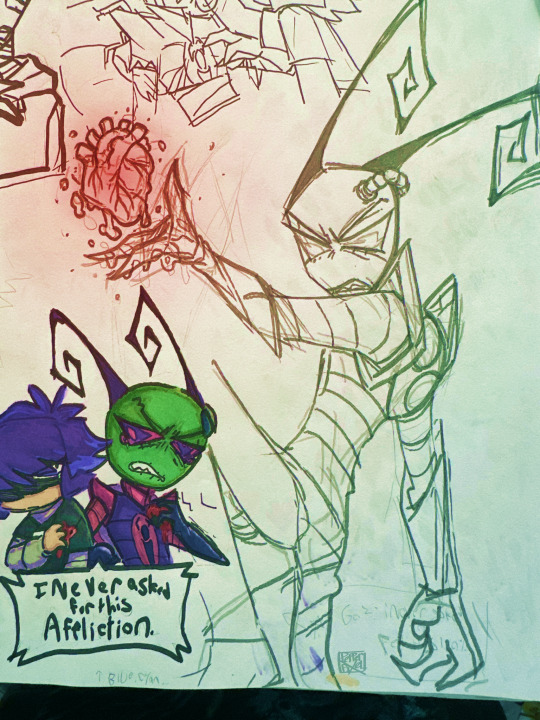

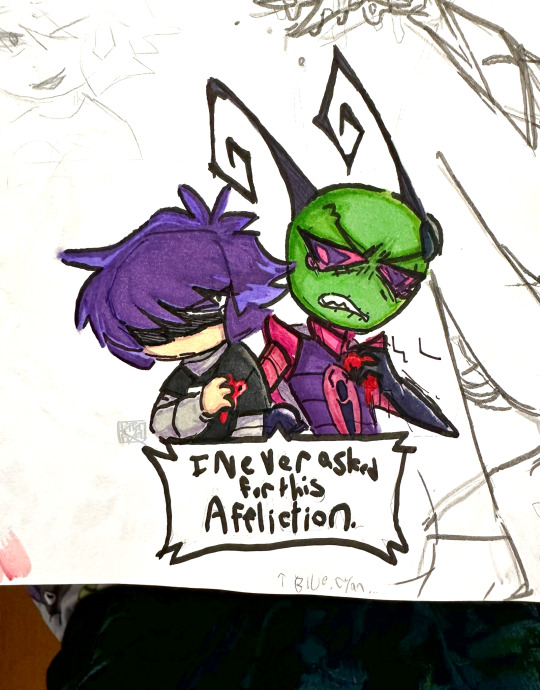
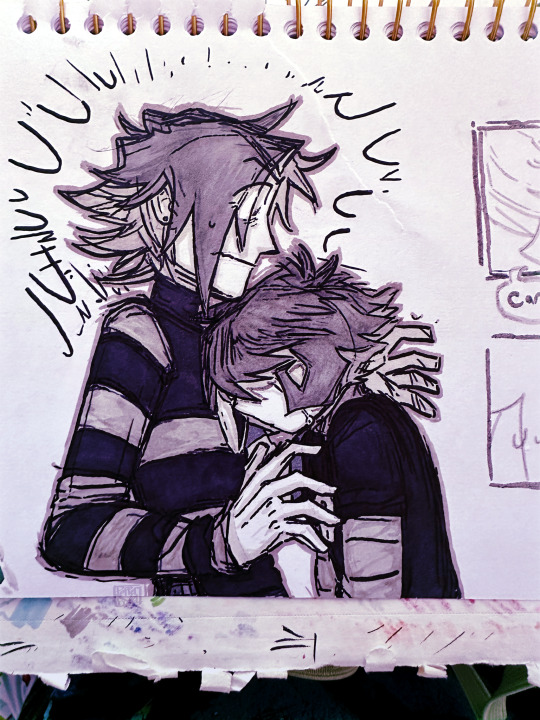

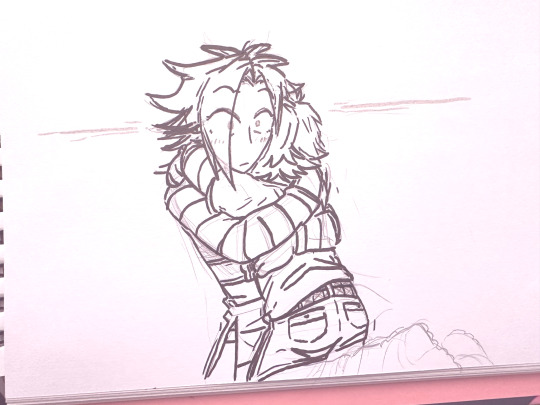
+ Butch 4 Butch +
(Except neither one of them is rlly that butch but holy fUCKING SHIT THAT SONG IS LITERALLY THEM… the version of them I made up in my mind palace… it’s them.)
Anywayyyy. Yeah! Have a tagr art dump..! aka, those vibes when you, out of a series of moments of temporary insanity, end up finding, taking in, nursing back to health and eventually falling into a tangled messy yearning situationship w the asshole tsundere alien who tried to destroy your entire planet… rlly extremely relatable vibes!!
#invader zim#gaz membrane#tak#invader tak#tagr#iz tak#iz gaz#doodles#caption for the 3rd pic:#ton ten photos taken seconds before a goth girls plushie security system shoots you in the head.#anyway… yeah… I love these two#I think a lot my ideas for them are informed by this one fanfic I read as a young teen/child… but I don’t actually remember anything#concrete?? just general story beats? and I’m pretty sure my ideas deviate from it a good bit. but#I think that fic def formed the basis for my tagr love and appreciation#I think they could be complicated and messy and painful and fun as fuck#I have ideas for them lol. and some more art. so hopefully I’ll be able to post that soon too#but for now… enjoy sketch dump of messy goth saphics#*top ten moments. not ton. spellings hard ghgh#I think tak is very hesitant about initiating physical contact and intimacy and being cuddly. cuz of pride and also repression#but I saw a post talking about irkens being naturally very touchy feely affectionate and I def agree…#so. tak is wary of stuff like that at first. but once u break thru that initial barrier of her denying herself she’s actually sUPER TOUCHY#gaz has unleashed a pda beast she just doesn’t kno it yet
150 notes
·
View notes
Text
very important definitely no reason question do you guys think bingge would seduce (or maybe even sleep with) men if it meant obtaining something/getting the upper hand/manipulation or is that reserved for women only
this is specifically abt huan hua disciple bingge btw, so keep in mind that he was already out n' about in the promising demon ladies and doing demon managing stuff. of course he's only marrying women but that doesn't mean he won't try anything with men!
edit: sorry i forgot to clarify lol. don't think of this as "pidw restricts this and that, so ______."
like, pretend that pidw is a completely separate piece of media from svsss (and an actually well written not so much a cliche stallion novel, sorry airplane bro lol) and you're watching/reading bingge's huan hua palace arc. could you see him doing something like that? or would the men!! danger!! trauma still prevail? (ex: leading on gyx's friend for important info who happens to be a male and very into bingge. or, shutting down those ideas because the thought of even acting in such a way for a man greatly uneases or triggers him)
#haha this is for no reason definitely#the real question is if he'd bottom for manipulation information shit#alr. yall can leave long detailed reasons why if u want#i'd actually prefer that lmao#I NEED HELP WITH WRITING AUAUGAJGAIAGG IM ASKING THE MASSES!!!!#svsss#mxtx svsss#luo binghe#luo bingge#the scum villain's self saving system#svsss polls
80 notes
·
View notes
Text
OBSESSED with the latest dungeon meshi episode dropping a ton of worldbuilding onto characters who are like "i don't care about that. im hungry"
#apparently my favorite lore delivery system is 'we were informed of this but the protagonist doesn't care'#posts by me#dungeon meshi
139 notes
·
View notes
Text
I NEVER REALLY UNDERSTOOD LUO BINGHE UNTIL NOW
Holy shit I was so swayed by SQQ’s POV that I honestly never truly understood LBH’s intentions until I read this line In Ch 2 (SVSSS Seven Seas)/Ch 13 at the demonic evasion arc:
When a person is affected with Without a Cure, starting from their wound, their spiritual flow becomes disconnected. This schism slowly spreads to their entire body. In the end, not only does their spiritual qi coagulate and stagnate, so does their blood."
So then when in Ch 6 (SVSSS SS)/Ch 34, LBH fed SQQ his blood and subsequently used his blood to seemingly "torment" SQQ during the water prison arc, all of this got me thinking....
What if everything LBH did with his demonic blood this entire time was to save SQQ from Without a Cure?
Like yes, he probably did have other intentions such as tracking him, making SQQ horrified at the fact that he has demon blood inside him when he hated demons so much but I honestly think the main reason LBH forced SQQ to drink his blood, and I would even go further as to say that his main motivation when he trained under Meng Mo, was not to become the “strongest” in the general sense but to heal SQQ. Hear me out. The first thought white lotus LBH has when SQQ got poisoned in Ch2/13 was
the demons had harmed his teacher to the point that he might be crippled—he might even lose his life. And all because of him.
LBH probably was a direct witness to how a whole team of Cang Qiong mountain peak lords needed to revolve around SQQ, with Mu Qingfang constantly providing prescriptions and LQG clearing his meridians and probably YQY hovering around SQQ dying with worries, to maintain his health post the SHL -demon evasion, he must have felt absolutely terrible about it! And that guilt literally haunted our bing-pup like he never once stopped thinking about it; no wonder he offered himself to take care of everything including the nutrition of SQQ's food, snaccs, water, small-big errands, and even wanted to pick that "Snow something Lotus" flower for Shizun! Without a Cure affecting SQQ was on LBH's mind ever since he was 15 and for all 3 years he was in the Endless Abyss.
This is absolutely evident when black lotus LBH returned and started to chase SQQ, SQQ's inner monologue was cursing how Without a Cure is stagnating his ability to coordinate and run, I am certain that LBH was not blind to just how much SQQ was struggling with that poison in his body. My theory was further confirmed when LBH finally caught up to SQQ:
“While Shen Qingqiu was still in the midst of confusion, Luo Binghe flipped his hand over. “You were infected?” .....“This hand of Shizun’s is plagued with misfortunes.”
Bruh, LBH may be giving the sadistic energy of an abandoned demonic child (thanks SQQ unreliable narrator) but here is clear evidence that the thing he was most worried about is SQQ's blood coagulating and him dying of demonic poison. What this tells me is that Without a Cure seemed to be activated and/or further exacerbated by other demonic poisons. LBH was also clearly still carrying the guilt of SQQ saving him with that hand! Following on immediately, what he did was 1) punch SQQ, then 2) says "An eye for an eye. Since Shizun sowed the seeds, he should reap the bitter fruit himself. Shizun should personally make up for himself" and 3) straight up fed SQQ his demonic blood.
White Lotus LBH never died. Both actions are for the benefit of SQQ, 1) I think he did this to get SQQ to cough up coagulated blood after SQQ was poisoned by that Jin Lan City sower and 3) LBH's quick return from Endless Abyss was so that he can feed Shizun his heavenly-blood to help cure him. I have reason to believe that LBH's demonic blood is the CURE to WITHOUT A CURE. Why else pay such specific attention to SQQ's hand out of literally any other body-part after a 3 year reunion?
But what I find most fascinating is 2) LBH’s words are nearly always laced with double meaning. “An eye for an eye” here isn’t necessarily just him blaming SQQ for kicking him and unlocking his demonic heritage but he wants to repay SQQ for taking on Without a Cure back then by giving him his demonic blood as a cure now. Another interpretation is that LBH deflected feeling the guilt of indirectly harming SQQ by verbally jabbing him. He tried to make SQQ feel guilty about tossing him into the Endless Abyss when he himself couldn't bare to think that his Shizun got hurt again on the same hand that saved him all those years ago. SQQ of course is an unreliable narrator and tricks us into thinking that LBH's actions matched his words when if we look closer, they're LITERALLY THE EXACT OPPOSITE.
Right after the reunion, SQQ "didn’t know how he made it back to the Jin Zi Weapons Shop," which has me believing that LBH must have been doing something to surpress SQQ's Without a Cure's effects with his demonic blood.
During the Water Prison arc, LBH seems like he is tormenting SQQ by demonic blood manipulation but if we really read carefully:
…strange sensation of something crawling inside his blood vessels....Luo Binghe said leisurely, “Spleen, kidneys, heart, lungs.” Though it wasn’t to the point of extraordinary anguish, it was still awful to suffer through.
Doesn't this sound like LBH trying to get the blood in SQQ flowing again to prevent coagulation after SQQ had been in presumably a seated position for a long time jailed in the Water prison? Once again, LBH's intentions behind his actions are the opposite of his words, he may be emotionally hurt by SQQ's silent response to him asking whether Shizun regrets kicking him down the Endless Abyss but his first and foremost concern is SQQ's health. This totally explains LBH's extremely low anger points! SQQ seemingly mistook LBH’s worry as anger! If SQQ asked the System for LBH's worrywart points, it would have been like ~the limit does not exist~. 🤯🤯🤯
Bruh, it’s so telling when Gongyi Xiao went to untie SQQ's immortal binding cables two days later when SQQ noted:
His spiritual energy was unmistakably back in operation and flowing smoothly. When he’d been imprisoned, he had been in the middle of a random Without a Cure flare-up, but after two days of being tied up by the immortal-binding cables, the poison had unexpectedly been suppressed again. Was this following the same principle as fighting fire with fire, or how two negatives make a positive?
No SQQ you oblivious gay, LBH was circulating your coagulating blood for you and suppressing the effects of your poison! We as readers can get so misled by SQQ constantly worrying about how Without a Cure randomly stops his spiritual powers that we forget about the actual main issue, blood stagnation and coagulation, which can absolutely kill him. Also, when SQQ escaped the Water Prison, LBH didn't try to manipulate the blood in SQQ's body because now he didn't need to, he’s done it already. He never wanted to do more than what was necessary for Shizun’s health. LBH tried to convince SQQ to come back when he could have used his powers. SQQ always had agency because LBH loves and respects him too much.
The next time SQQ got poisoned was by that sower who hid amongst the Huang Hua Palace disciples in Hua Yue city right before his self-detonation. He couldn't attack the sower with fire but then complained that it must have been Without a Cure that flared up again. Somehow, silly SQQ kept randomly getting himself poisoned so doesn’t it make sense that LBH keeps track of his Shizun so that his own demonic blood could notify him of any potential future SQQ demonic poisonings?
Bruh, the worrywart White-Lotus LBH never fucking died, SQQ ah SQQ you silly silly man. LBH has always been, even if he says hateful words, worried about you and your health and made it his top priority. What made LBH lose his mind though were
everytime LBH tries to save SQQ, SQQ thinks that he is using his demonic blood/demonic poison to do all these unfathomable things when using demonic poison is literally the last thing LBH would do because he has literal guilt trauma around it.
SQQ keeps calling LQG, GYX and literally anyone else to save him when LBH has been the one doing all the work.
Then we arrive at Xing Mo’s recoil exacerbating LBH’s insecurities.
“Shizun, look at what I’ve become. Am I strong enough? Do you know how I spent those years within the Endless Abyss? For three years underground, at all times and all moments, my mind thought only of Shizun. I wondered why Shizun would do this to me, why he refused to give me even a single chance to explain or plead my case.”
He did so much for Shizun’s health but never got a chance to explain why! And then when SQQ self-detonated, LBH thought:
Didn’t Shizun hate his blood more than anything? Wasn’t he unwilling to even be near him, to associate with him at all?
So why, at the last moment, had he so gently helped to contain Luo Binghe’s mind, as tender as he had been in those years long past?
The blood here doesn't just have racist but literal connotations, LBH literally thought that SQQ hated the very demonic blood coursing through his veins, so that's why he kept forcing SQQ to drink it. LBH's every action, with me now looking back at all this evidence, is SO fricking justified. From his POV, isn't it more like SQQ is the constantly sick child throwing a tantrum about not wanting to drink bitter medicine? LBH, After all this effort of forcing himself to go through literal hell, training himself, chasing SQQ, imprisoning SQQ (LBH is giving Lan Wangji energy here) so that his Shizun can stop accidentally poisoning himself, SQQ somehow got put in harms way again but on top of that, died because of him. SQQ died whilst also restoring and reaffirming himself as the Shizun who had once been so good to him. 😭😭😭

All this absolute adds so much more weight as to why LBH was never ever going to let SQQ out of his sight ever again, as a corpse or alive, from that moment onwards.
#Im truly sorry if this was all incredibly obvious information for the rest of the fandom but my pea-sized brain exploded ok#svsss spoilers#svsss#svsss meta#bingqiu#luo binghe#shen qingqiu#shen yuan#scumbag system#scum villian self saving system#ren zha fanpai zijiu xitong#mxtx#mxtx svsss#svsss analysis
772 notes
·
View notes
Note
Omg sexy evil eye man hi
I’ve just logged in to this account and I see this? At 10 in the morning?
#magposting#answering asks#I’ve been informed about the ‘tagging system’#According to Murphy this is where ‘we get unprofessional’#So be aware. You are never truly anonymous.#tmagpod#the magnus archives#tma#tmagp#the magnus institute#elias bouchard
70 notes
·
View notes
Text
new jobs be like do not worry queen we will train you thoroughly until you're confident and calm at the job. btw you're working alone tomorrow and there is no one available for you to call if you need help and i also refuse to check whether you even have access to the system. good luck :3
#i think my anxiety just got uncured. my years of therapy undone. i'm shaking#i texted my boss asking whether she knows if i have access to the system like i requested last week because i need it for my first alone-#shift tomorrow morning and she says 'ill get back to you about that tomorrow afternoon'#too tired to even argue with that. ok queen yes do check it tomorrow about 7 hours after i need the information yeah that works#kim.txt
61 notes
·
View notes
Text
r/systemscringe fools still think all voices in DID are bad. 😔

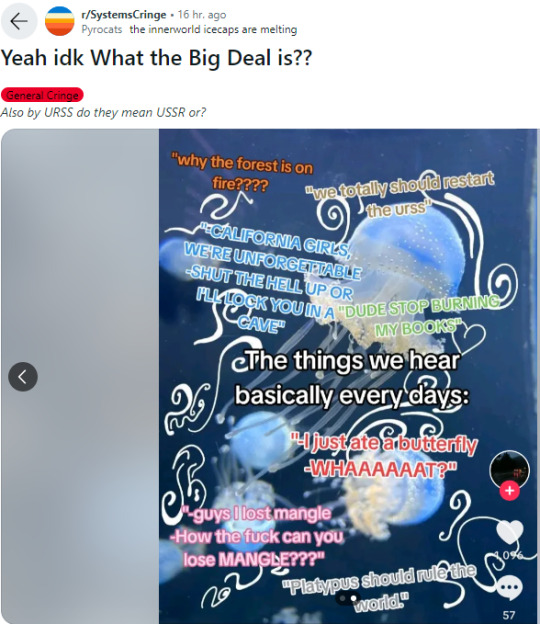
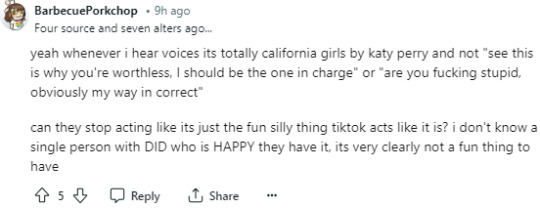
Now, I posted this in my big debunking post of r/systemscringe's lies about DID, but it bears repeating... Studies have shown that nearly 70% of voice hearers with DID report that they would miss the voices if they stopped. This is compared with much lower margins for schizophrenic groups:

Now, it is absolutely valid if you're a system who just hates all aspects of being a system, including hearing the voices of your alters.
After all, nearly 30% of DID patients in this study did, which is still a pretty huge number. It's a big minority.
But this is not everyone. This is not the majority.
Just because you experience something a certain way, that doesn't mean everyone will!
And having a good relationship with your alters isn't a sign of faking!
#syscourse#pro endogenic#pro endo#psychiatry#psychology#sysblr#multiplicity#information#mental health#plural#plurality#system#systems#plural system#actually a system#actually plural
112 notes
·
View notes